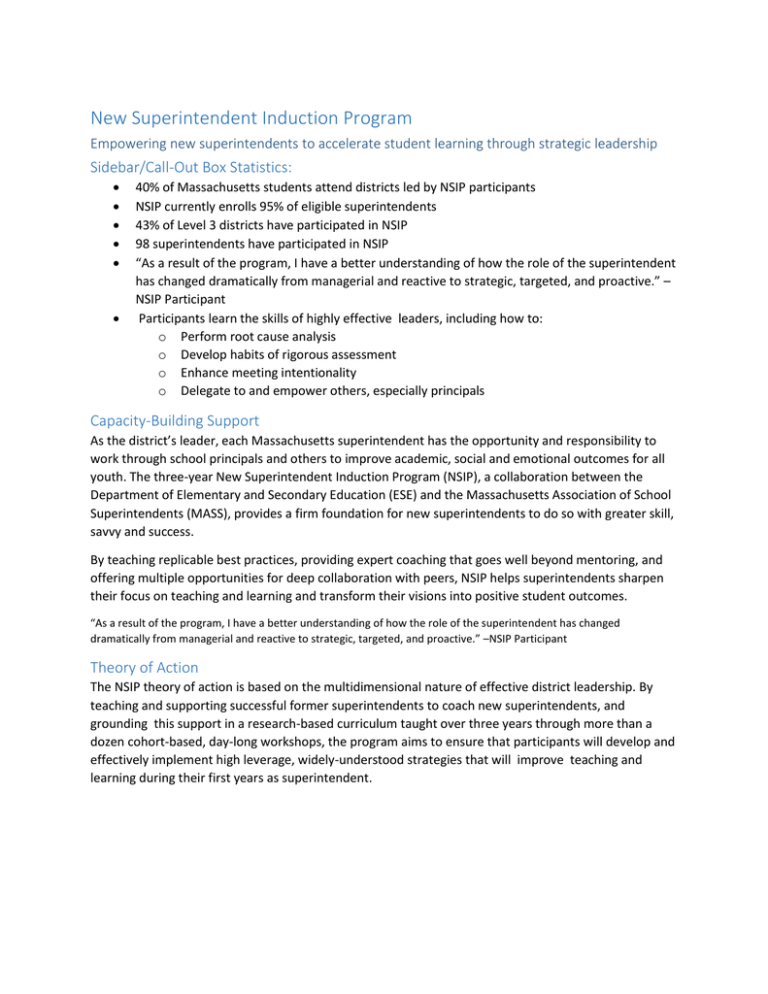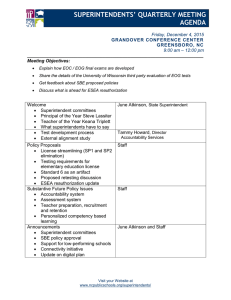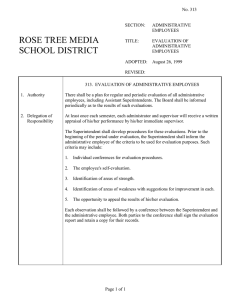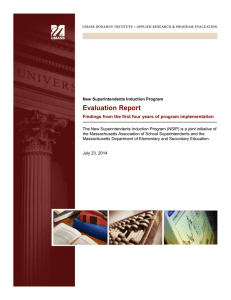nsip
advertisement

New Superintendent Induction Program Empowering new superintendents to accelerate student learning through strategic leadership Sidebar/Call-Out Box Statistics: 40% of Massachusetts students attend districts led by NSIP participants NSIP currently enrolls 95% of eligible superintendents 43% of Level 3 districts have participated in NSIP 98 superintendents have participated in NSIP “As a result of the program, I have a better understanding of how the role of the superintendent has changed dramatically from managerial and reactive to strategic, targeted, and proactive.” – NSIP Participant Participants learn the skills of highly effective leaders, including how to: o Perform root cause analysis o Develop habits of rigorous assessment o Enhance meeting intentionality o Delegate to and empower others, especially principals Capacity-Building Support As the district’s leader, each Massachusetts superintendent has the opportunity and responsibility to work through school principals and others to improve academic, social and emotional outcomes for all youth. The three-year New Superintendent Induction Program (NSIP), a collaboration between the Department of Elementary and Secondary Education (ESE) and the Massachusetts Association of School Superintendents (MASS), provides a firm foundation for new superintendents to do so with greater skill, savvy and success. By teaching replicable best practices, providing expert coaching that goes well beyond mentoring, and offering multiple opportunities for deep collaboration with peers, NSIP helps superintendents sharpen their focus on teaching and learning and transform their visions into positive student outcomes. “As a result of the program, I have a better understanding of how the role of the superintendent has changed dramatically from managerial and reactive to strategic, targeted, and proactive.” –NSIP Participant Theory of Action The NSIP theory of action is based on the multidimensional nature of effective district leadership. By teaching and supporting successful former superintendents to coach new superintendents, and grounding this support in a research-based curriculum taught over three years through more than a dozen cohort-based, day-long workshops, the program aims to ensure that participants will develop and effectively implement high leverage, widely-understood strategies that will improve teaching and learning during their first years as superintendent. The Massachusetts Way of Leading NSIP is influencing the culture of district leadership by focusing on a) the role a coherent, broadlyunderstood, and well-implemented strategy plays in district improvement; b) the responsibility the superintendent has to support and empower school leaders; and c) habits of mind that enable superintendents to succeed. The program aims to develop superintendents who can collaborate with others to develop and communicate a shared understanding of effective instruction to every district stakeholder. As conceived by NSIP leaders, an effective superintendent is one who thinks and acts strategically, empowers and builds the capacity of school leaders, is committed to focusing the work of the district on improving student learning, and is dedicated to his/her own and others’ continuous development. Program Structure NSIP seeks to ensure that each superintendent begins their first year with a strong entry plan for engaging stakeholders and gathering the information needed to develop a widely-understood and focused strategy to accelerate student learning. During the program’s first year, superintendents are supported in the development of three public work products: 1) the entry plan; 2) a report of entry findings; and 3) a district strategy for improving student learning, embraced and adopted by the school committee. Superintendents are supported to engage stakeholders each step of the way to ensure that staff, union leaders and other stakeholders understand the district’s key issues, action plan, intended outcomes, and the roles that each stakeholder can play in leading the district towards its goals. In years two and three, coaching and workshops gradually decline, but participants continue to receive opportunities for coaching and collaboration focused on navigating the myriad challenges of successfully implementing and assessing the district’s improvement strategy. Impact Many participants report that sustained relationships with NSIP peers and coaches are invaluable in the years after their formal participation in the program ends. The program’s focus on strategy has led to stronger district improvement planning and more purposeful leadership focused on collaborating with principals and achieving results in the classroom. By helping new superintendents understand ways to implement and integrate statewide priorities in more strategic ways, NSIP has accelerated effective implementation of both the new educator evaluation requirements and Common Core alignment. For More Information ESE and MASS will be sponsoring future NSIP cohorts. Visit the MASS website, http://www.massupt.org/pages/MASS, and select the New Superintendent Induction Program link to learn more.




